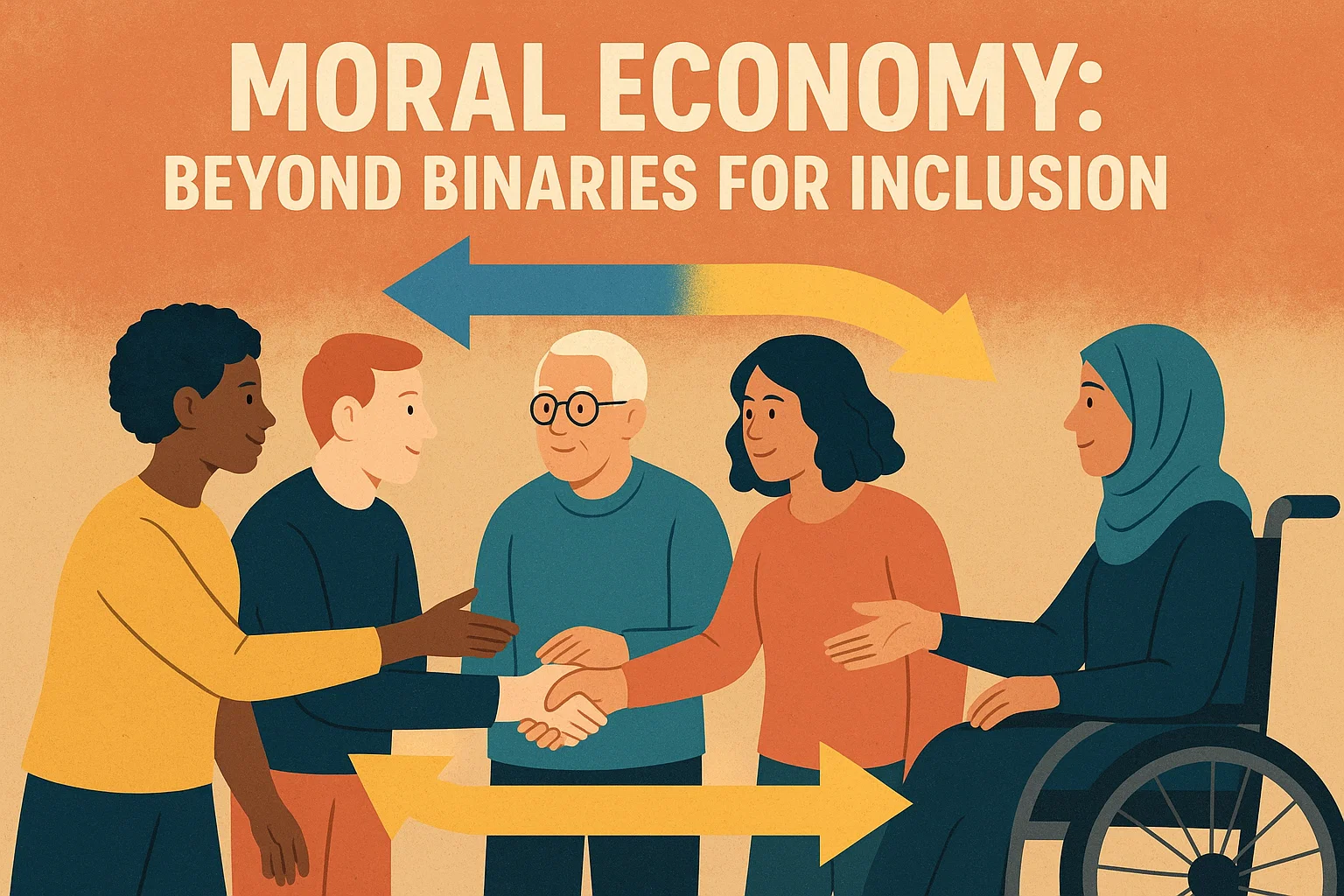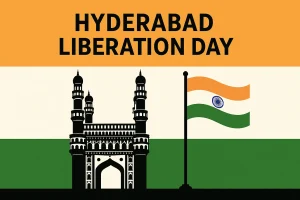Moral Economy: Beyond Binaries for Inclusion
Explores India’s hybrid path blending markets and welfare, showing how the moral economy balances growth with fairness, dignity, and inclusion.

Introduction
Shashi Tharoor’s “Between Profit and Promise” (The Indian Express, September 18, 2025) situates rising global discontent with capitalism, especially among youth, within India’s own economic journey from Nehruvian socialism to post-1991 liberalisation. The central issue is how to reconcile market dynamism with fairness and dignity. His thesis rejects the outdated binary of capitalism versus socialism, arguing instead for pragmatic hybrids. The hypothesis is that blending markets with welfare can deliver both growth and inclusion. The warrant lies in historical welfare models and India’s current mix of public and private systems. Tharoor advocates designing moral economies that prioritise balance over dogma and inclusion over exclusion.
Handlooms and Human Costs
The handloom sector illustrates this tension vividly. Weaving is both an economic livelihood and a cultural marker, yet it is steadily undermined by mechanised alternatives that promise efficiency but erode dignity. In narrow market terms, cheaper, mass-produced fabrics are rational, but they devastate communities that depend on artisanal work. The loss is not only of jobs but of identity, tradition, and regional stability. This clash between capitalist progress and human fairness exemplifies the challenge of reconciling efficiency with equity.
Despite these pressures, handloom weaving has not disappeared. It has endured through strategies that reflect a moral economy in action. By valorising tradition, fabrics are marketed as heritage goods whose value lies in authenticity, not merely price. Public support through subsidies and certification schemes reaffirms that livelihoods and cultural assets merit safeguarding. Hybrid production methods, blending artisanal skills with modern marketing and distribution, show that survival does not require abandoning identity but adapting it intelligently. These strategies demonstrate that markets can be recalibrated to recognise social values as integral, not incidental.
Precarity in Modern Sectors
The dilemmas of handloom workers resonate beyond traditional crafts. The gig economy, often hailed as a symbol of innovation, repeats the same story of precarious livelihoods hidden beneath the gloss of flexibility and consumer convenience. Drivers, delivery personnel, and freelancers often lack protections, fair pay, and stability. Their struggles for recognition and rights represent another form of moral economy: collective insistence that technological progress must not come at the cost of human security. Here too, the question is not whether markets should exist but how they are structured, whose interests they privilege, and what safeguards they embed.
Even the technology sector, emblem of twenty-first-century dynamism, reflects similar contradictions. Its extraordinary wealth creation sits uneasily alongside exclusion, monopolistic power, and stark disparities in access. Calls for fair taxation, ethical standards, and regulatory checks echo the same moral logic: that innovation, however dazzling, cannot justify systems that leave millions behind. These parallels show that the moral economy is not confined to tradition but stretches across modern industries, demanding balance in every sphere.
India’s Hybrid Path
India’s broader economic journey underlines this hybrid reality. The early decades of independence were marked by a socialist-inspired model prioritising equity, state ownership, and cautious global engagement. By the late 1980s, inefficiency and fiscal crises exposed the limits of that approach, leading to the sweeping liberalisation of 1991. Market reforms unleashed growth, expanded the middle class, and spurred a technological renaissance. Yet the promises of liberalisation have been unevenly realised. Jobless growth, wealth concentration, and rural distress fuel growing scepticism.
The result is neither a pure capitalist state nor a socialist one but a complex amalgam. Glittering private hospitals stand beside underfunded public clinics, while stock market booms coexist with farmer protests and gig workers’ struggles. India embodies a pragmatic hybrid: a society where welfare schemes like the Mahatma Gandhi National Rural Employment Guarantee Act (MGNREGA) sit alongside start-up culture and corporate giants. This hybridity is not confusion but necessity, born of recognition that extremes of ideology cannot address the needs of a populous, diverse, and aspirational nation.
Global Lessons
This pragmatic blending finds echoes worldwide. The welfare states of post-war Europe were not just about economic reconstruction but about rebuilding social trust. Britain’s National Health Service was founded on the conviction that healthcare should not be a commodity but a right of citizenship. Such institutions illustrate the principle that markets must be complemented by protections for fundamental human needs. The lesson is enduring: societies that fail to embed markets within systems of solidarity risk alienation, unrest, and collapse.
Yet the debate today has evolved in vocabulary. It is less about abstract ideological loyalties than about practical outcomes. People ask whether their economies deliver prosperity, security, and opportunity. They judge systems not by labels but by lived experiences. The dissatisfaction voiced by young people across the world reflects a demand for economies that respect dignity, not a call to revive dogmatic socialism or unregulated capitalism. When they invoke “socialism”, they often mean compassion over competition; when they critique capitalism, they question its exclusionary tendencies, not its capacity to generate innovation.
Towards a Moral Economy
The moral economy lens is powerful precisely because it transcends sterile binaries. It asks not whether one aligns with capitalism or socialism but whether the system in place delivers fairness. This perspective exposes the inadequacy of simplistic polemics: dismissing socialism by citing authoritarian regimes, or condemning capitalism as inherently exploitative, ignores the complex hybrids most modern societies have become. Regulations, redistributive taxation, and welfare nets have long integrated socialist principles into capitalist frameworks, just as innovation and enterprise have flourished under socialist-leaning governments.
Critical reflection, however, is essential. Overprotecting traditional sectors can ossify inefficiencies, discourage creativity, and limit opportunity. Cultural branding sustains niches but cannot substitute for large-scale employment. The challenge lies in balancing dignity with transformation, crafting policies that protect without paralysing. Moreover, the moral economy raises the question of whose values prevail. In unequal societies, elites may shape norms to their advantage. A genuinely inclusive moral economy must be vigilant against reinforcing privilege under the guise of protection, ensuring that the marginalised remain central to the conversation.
Constructive Dissatisfaction and Future Directions
The optimism in current debates lies in their very intensity. Discontent signals engagement, not apathy. People’s insistence on fairness reflects enduring belief that economies can and should be organised more justly. The so-called “magic of the market” means little to those excluded from it; their demands for inclusion are not destructive but constructive. They point the way towards more compassionate and pragmatic systems, rooted in the conviction that the economy must serve society, not the other way round.
The task ahead is to design systems that are intelligent, compassionate, and pragmatic—capable of harnessing capitalist dynamism without succumbing to its excesses, and borrowing from socialist ideals without lapsing into rigidity. Most successful economies are already hybrids, capitalist in structure yet infused with social protections reflecting a collective sense of fairness. The quest for a moral economy is thus not nostalgia for the past but a forward-looking imperative, demanding that progress be measured by the dignity and inclusion it affords, not merely by growth rates.
Conclusion
In the final analysis, the true divide is not between capitalism and socialism but between economies that serve human beings and those that leave them behind. India, with its pluralism, pragmatism, and long tradition of hybrid solutions, is well placed to lead this global conversation. The goal is not victory in an ideological battle but the construction of societies where fewer people fall through the cracks, where balance replaces dogma, and where profit never eclipses promise.
Subscribe to our Youtube Channel for more Valuable Content – TheStudyias
Download the App to Subscribe to our Courses – Thestudyias
The Source’s Authority and Ownership of the Article is Claimed By THE STUDY IAS BY MANIKANT SINGH




